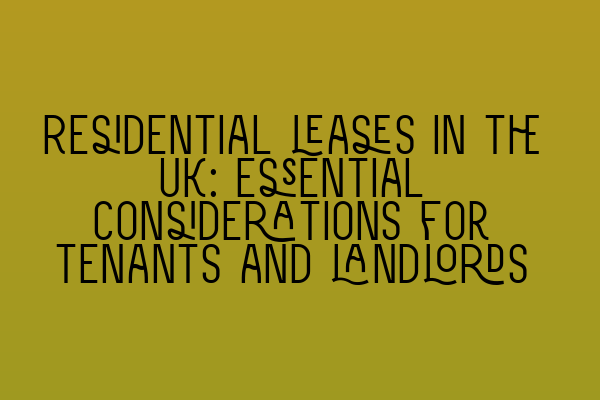Residential Leases in the UK: Essential Considerations for Tenants and Landlords
Introduction
Residential leases play a crucial role in the UK’s property market, providing a legal framework for tenants and landlords to secure their rights and obligations. Whether you are a tenant searching for a new home or a landlord looking to lease your property, understanding the key considerations surrounding residential leases is essential to protect your interests. In this article, we will explore some important aspects of residential leases, helping both tenants and landlords navigate the process successfully.
1. The Importance of Understanding the Lease Agreement
Before signing any lease agreement, it is vital for both tenants and landlords to thoroughly review and understand the terms and conditions. A lease agreement is a legally binding contract that outlines the rights and responsibilities of both parties involved. It covers various aspects, including the duration of the tenancy, rent amount, maintenance responsibilities, and rules regarding pets, subletting, and termination.
To ensure a smooth tenancy, tenants should carefully review the lease agreement to ensure they understand their obligations and rights. Landlords, on the other hand, must ensure the lease agreement reflects their requirements and protects their property. Seeking legal guidance can be invaluable in this process.
2. Length and Renewal of the Lease
Residential leases in the UK come in various lengths, with the most common being six to twelve months. Shorter leases offer flexibility to tenants, allowing them to easily relocate, while longer leases provide stability and security. Landlords should consider their own preferences and the rental market when deciding on the length of the lease.
The lease agreement should also state whether it can be renewed and under what conditions. Understanding the renewal process is crucial for both tenants and landlords to plan ahead and avoid any misunderstandings. Additionally, both parties should be aware of any notice periods required for lease termination or renewal.
3. Responsibilities for Maintenance and Repairs
Maintenance and repairs are important considerations for both tenants and landlords. The lease agreement should clearly outline the responsibilities of each party in this regard. Typically, tenants are responsible for day-to-day maintenance, such as keeping the property clean and reporting any minor repairs needed. Landlords, on the other hand, are usually responsible for major repairs and ensuring the property is safe and habitable.
It is important for tenants to promptly report any issues to the landlord or managing agent, while landlords should address maintenance requests in a timely manner. This can help maintain a good landlord-tenant relationship and avoid potential legal disputes.
4. Rent and Deposit
The lease agreement should state the amount of rent, the frequency of payment, and the due date. It is essential for tenants to understand their rental obligations to avoid any late payment penalties or eviction notices.
Additionally, landlords are legally permitted to request a security deposit as protection against damages or unpaid rent. The deposit must be held in a government-approved tenancy deposit scheme, and the terms regarding its return should be clearly outlined in the lease agreement.
5. End of Tenancy Considerations
Both tenants and landlords should be familiar with the end of tenancy process outlined in the lease agreement. This typically includes procedures for returning the property in its original condition, calculating any deductions from the security deposit, and arranging the final inspection.
Tenants should ensure they comply with these requirements to maximize the chances of receiving their full deposit back. Landlords must strictly follow the legal procedures regarding the return of the security deposit and any deductions.
Conclusion
Understanding the essential considerations surrounding residential leases is crucial for tenants and landlords in the UK. By carefully reviewing and understanding the lease agreement, considering lease length and renewal options, clarifying maintenance responsibilities, and being aware of rental obligations and end-of-tenancy procedures, both parties can protect their interests and maintain a harmonious landlord-tenant relationship.
If you require further guidance or assistance regarding residential leases in the UK, our team at SQE Property Law & Land Law is here to help. Contact us today for expert advice and ensure your lease agreement meets all your needs.
Related Articles:
– Legal challenges in property transactions: A comprehensive guide
– Dominate Property Law Questions: Avoiding Common Pitfalls
– Land Law Revision Tips: Ace Your Exam Preparation
– Mortgages and land law: Essential considerations for property transactions
– Environmental Ethics in Land Law: Balancing Development and Sustainability
